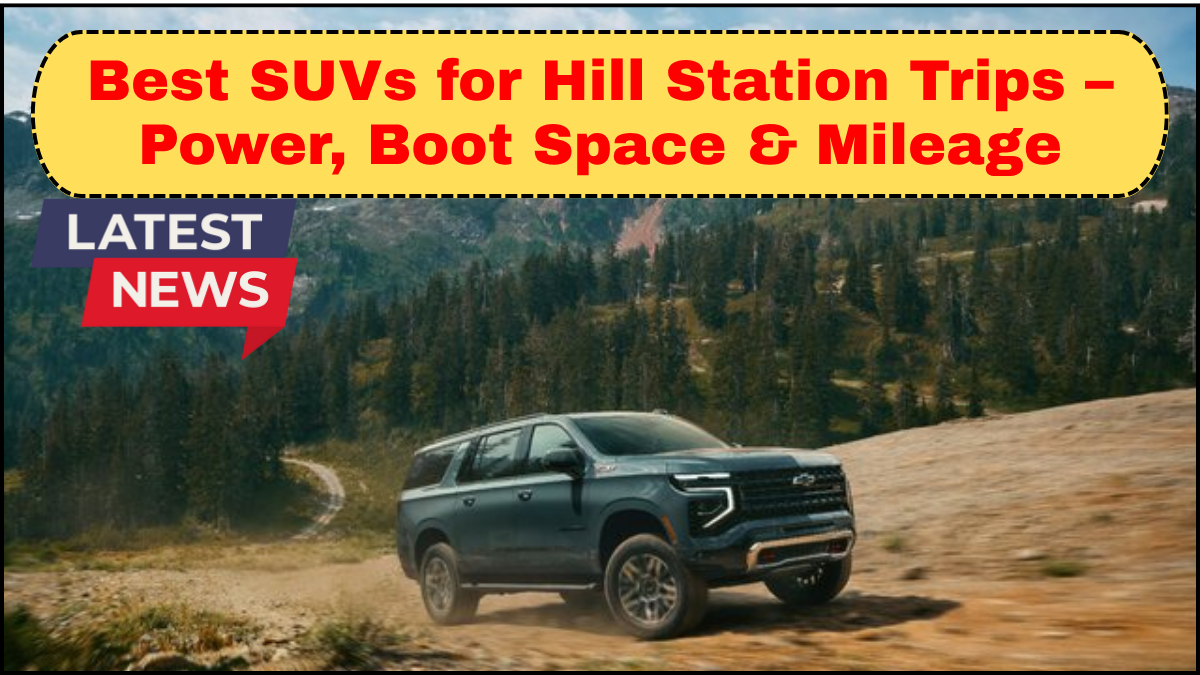Planning a mountain escape? The vehicle you drive can make or break your trip. Whether you’re weaving through narrow hillside roads or ascending steep gradients, choosing the right SUV for hill trips is critical. You need a vehicle with strong power delivery, ample boot space for luggage, and good mileage for long-distance efficiency. Here’s a detailed look at the top SUVs that tick all the right boxes for mountain travel, ensuring a smooth and safe journey no matter how challenging the terrain.

Why Choose an SUV for Hill Trips?
When driving in hilly or mountainous terrain, you encounter unpredictable weather, steep climbs, tight hairpin bends, and occasionally, rough or unpaved roads. SUVs are built to handle these conditions with confidence, thanks to:
-
High ground clearance: Helps avoid underbody damage on rocky or uneven surfaces.
-
Powerful engines: Essential for tackling inclines and overtaking safely on narrow roads.
-
All-wheel or four-wheel drive options: Offer better grip on slippery surfaces.
-
Larger boot space: Perfect for carrying luggage, gear, and emergency supplies.
Top SUVs for Hill Station Trips
1. Toyota Fortuner
One of the most reliable SUVs in India, the Fortuner combines rugged power with a premium feel.
-
Engine: 2.8L diesel engine delivering up to 500Nm torque.
-
Mileage: Approx. 10–14 km/l.
-
Boot Space: 296 liters (expandable with foldable rear seats).
-
Why it’s great: Outstanding hill control assist and robust build. It thrives on steep roads and rough tracks.
2. Mahindra Scorpio-N
A classic Indian SUV redefined with modern engineering and style.
-
Engine: 2.2L mHawk diesel engine.
-
Mileage: 14–16 km/l (diesel variant).
-
Boot Space: Around 460 liters.
-
Why it’s great: The Scorpio-N features an advanced 4X4 system and has proven mountain travel capabilities, especially in the Himalayas.
3. Tata Safari
A powerful yet comfortable SUV for family or group trips to the hills.
-
Engine: 2.0L Kryotec turbocharged diesel.
-
Mileage: 14–16 km/l.
-
Boot Space: 447 liters.
-
Why it’s great: Excellent suspension tuning for hilly terrain. The commanding driving position gives superb visibility on twisty roads.
4. Hyundai Creta
Ideal for those seeking a balance of city use and occasional hill station travel.
-
Engine: 1.5L diesel/petrol variants.
-
Mileage: 16–20 km/l.
-
Boot Space: 433 liters.
-
Why it’s great: While it’s not a hardcore off-roader, the Creta’s hill start assist, traction control, and smooth ride make it a solid option for lighter mountain routes.
5. Jeep Compass
A premium compact SUV with serious capability.
-
Engine: 2.0L Multijet diesel engine.
-
Mileage: Around 15–17 km/l.
-
Boot Space: 438 liters.
-
Why it’s great: Offers a refined AWD system with multiple terrain modes. It’s perfect for both urban driving and adventurous hilly getaways.
Factors to Consider When Choosing an SUV for Hill Trips
1. Power-to-Weight Ratio
In hilly regions, an SUV with a better power-to-weight ratio climbs more efficiently and handles slopes without engine stress.
2. Safety Features
Must-haves include electronic stability control, hill hold assist, traction control, and multiple airbags. Roads in mountain regions can be unpredictable.
3. Boot Space vs. Passenger Comfort
If you’re traveling with family or a group, you need a balanced setup — enough boot space without compromising on legroom.
4. Ground Clearance
Anything above 180mm is generally suitable for hill roads. More is better when facing unpaved or broken paths.
5. Fuel Efficiency
Mountain travel usually means longer drives and remote areas with fewer fuel stations. Choose an SUV with good mileage, especially in diesel variants.
Expert Tips for Driving in the Hills
-
Use engine braking rather than riding the brakes on descents.
-
Avoid overtaking on blind curves. Visibility is limited and accidents are common.
-
Keep your SUV serviced and tires checked before heading out.
-
Always carry snow chains if you’re visiting snow-prone areas.
FAQs
Q1: Is a petrol SUV good for hill station trips?
Yes, petrol SUVs offer good performance, especially turbocharged variants. However, diesel engines generally provide better torque and fuel efficiency, which is advantageous for hill climbs.
Q2: Which SUV is best for snow-covered hill roads?
The Jeep Compass with AWD or Toyota Fortuner with 4WD handle snow-covered roads well. Look for SUVs with traction control and snow driving modes.
Q3: Can compact SUVs handle mountain travel?
Many compact SUVs like Hyundai Creta or Kia Seltos can manage light to moderate hill terrain. For steeper or off-road routes, go for larger SUVs with better power and drivetrain options.
Q4: Is 2WD enough for hill stations or should I buy a 4WD SUV?
2WD can suffice for paved hill station routes. However, 4WD or AWD is highly recommended for tougher terrain, off-roading, or in monsoon/snow conditions.
click here to learn more